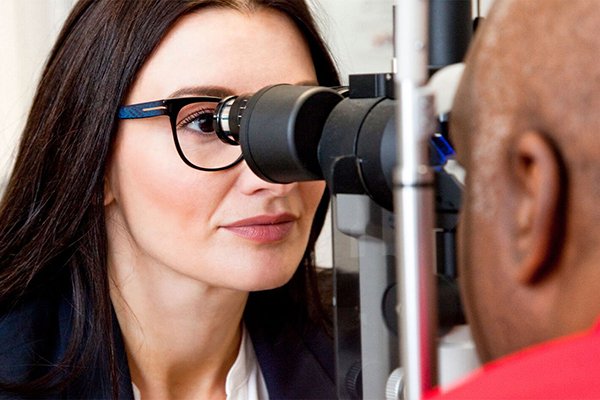Eye Exams in Livingston, NJ
At Associates in Ophthalmology, we are committed to using the most advanced technology to give you a complete, accurate and comprehensive eye exam in Livingston and greater New Jersey areas!
Why Are Eye Exams Important?

The word comprehensive means ‘complete’ or ‘including all or nearly all elements’ which is why we use it to describe our eye exams. This is because we are committed to using the most advanced technology to provide you with a complete and accurate eye exam. Take a look at why it’s so important to have a comprehensive eye exam every 1-2 years:
Early Detection of Eye Diseases
There are a variety of eye diseases that have no early warning signs. This means that without proper early diagnosis eye conditions such as glaucoma, cataracts or even diabetes may cause significant damage before they are noticed or diagnosed. These eye maladies have severe implications and can cause serious damage to your vision.
Accurate Prescriptions
Your eyes, just like your overall health, change over time. These changes mean that you could need a new prescription and therefore new glasses or contact lenses. It’s important to ensure your eyes are receiving the treatment they need to be healthy and functional!
Eye Health
Part of your eye health is their ability to work as a team, focus, and move properly. A series of tests will help your ophthalmologist to determine whether your eyes are up to par in these areas.
Optimal Vision
If you’ve never seen an ophthalmologist before, your appointment will ensure that your eyes are healthy and that you vision is optimal. Your ophthalmologist will also determine your visual acuity by assessing your ability to read various vision charts
Those are just a few of the reasons it’s so important to maintain your regular eye exams. Now that we have that covered, let’s move on to what you can expect during your eye exam.
Vision Screening
While vision screenings are incredibly important, they’re also relatively basic compared to a comprehensive eye exam. The screening will be able to indicate both current vision problems potential vision problems you may be developing. Though it is successful in scratching the surface of vision issues, it will not be able to distinguish exactly why you’re experiencing vision issues. Instead, you will likely be advised to make another appointment to further investigate and determine what is going on with your eyes. This is why it’s recommended to have a comprehensive eye exam from the get-go!
What Does an Eye Exam Consist of?
Pupil Dilation
One of the most important aspects of a comprehensive eye exam is pupil dilation. When your pupils are dilated, the ophthalmologist is better able to examine the internal structure of your eye. This is achieved painlessly by administering special drops that will successfully dilate your pupils within 20-30 minutes. At that point, the doctor will use a number of tools and methods to carefully examine your eyes. This is incredibly important in screening for various eye diseases and general eye health. Although the dilation of your pupils may make your eyes sensitive to light, this will last no more than several hours. If you find your eyes are especially sensitive, be sure to bring along sunglasses to decrease any possible agitation afterward. We advise you not to drive until your eyes have readjusted back to their normal state, so be sure to bring along someone that can drive you home.
Slit-Lamp Examination
Another crucial test is the Slit-Lamp Examination. Don’t be scared by the name, it’s merely an instrument used to examine the overall health of your eyes. The machine allows the doctor to get a highly magnified view of the structures within your eyes, from your eyelids and iris to assessing your retina and optic nerve. Talk about thorough! This test will help to check for signs of cataracts, macular degeneration, corneal ulcers and even diabetic retinopathy.
Glaucoma Test
Additionally, another important test to have done, especially if you’re over 45, is a glaucoma test. Glaucoma is a scary and tricky ailment because it has no warning signs. A glaucoma test will painlessly puff a small amount of air into your eye. Based on the resistance of the air, the machine will be able to calculate the pressure within your eye. This will help your doctor to determine whether you have or are starting to develop signs of glaucoma.
Refraction
Lastly, one of the most basic tests during a comprehensive eye exam is refraction. This involves the signature device in any eye doctor’s office – a phoropter! This is the part where you see a seemingly endless series of lens choices and you determine which is the most clear. Based on this, your doctor is able to determine your exact prescription in order for you to receive your best vision possible!
Eye Exam FAQs
Get your Eyes Examined by the Best Eye Doctors in Livingston
Now that you know the benefits of a general eye exam, schedule an appointment with the eye doctors at Associates in Ophthalmology. We offer eye exams to the Livingston and surrounding NJ areas. Is it time for your annual Eye Examination? Contact us to schedule your appointment, we can be reached at 973-992-5200.

